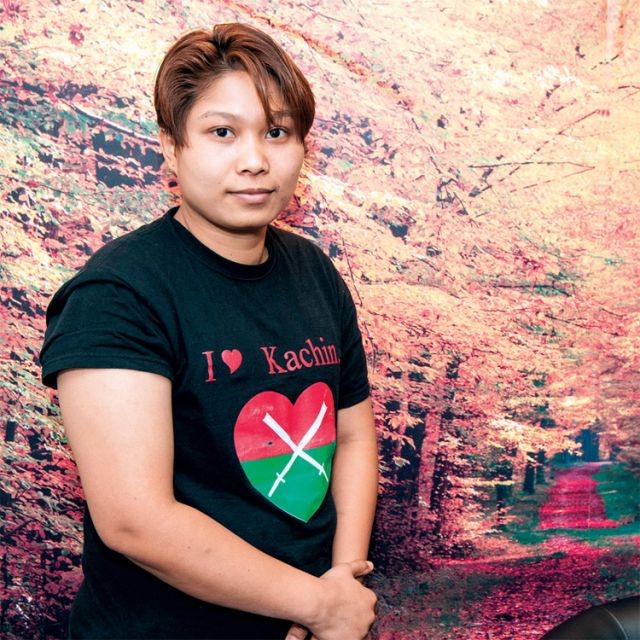“Please keep us in your prayers,” wrote Myitkyina Bishop Francis Daw Tang in an e-mail to The Catholic Register.
While Myanmar’s generals gradually learn to tolerate a little democracy, 100,000 ethnic Kachin, mostly Christians, are stuck in 15 camps near the Chinese border. The internal refugees are hoping a peace process that has stopped and started through a dozen meetings over the last year may finally let them go home.
Meanwhile in Toronto, one lone Kachin campaigner is reaching out for support from Canadian Catholics. Pri Ja N-Jang, a Catholic Kachin living in Toronto the last 10 years, compares the Kachin with the First Nations people of Canada. Despite modest reforms in Myanmar, the ethnic Kachin are marginalized, their culture suppressed and their traditional lands opened against their will for resource exploitation, said N-Jang.
“It’s a reform, democratic (government) but they still don’t give us a chance. For 60 years there has been no chance in our land,” she said. “The Burmese army controls most of Kachin State, because it is rich in natural resources.”
(In 1986 the military government changed Burma’s name to Myanmar, a change recognized by the United Nations but not by the governments of Canada or the United States.)
Daw Tang has pleaded for peace, while Caritas Myanmar struggles to feed and care for displaced Kachin.
“As a Church we walk with our displaced people, watch their life being destroyed by war, their families fragmented by depressing life in the displaced camps,” Daw Tang wrote in a plea for peace and “true federalism” in early February.
Daw Tang said the internally displaced people now number more than 100,000 in at least 15 camps. The bishop is asking for a peaceful solution that respects the 1947 Panglong agreement, which guaranteed freedom and self-government to Burma’s minorities when the country slipped the bonds of British colonial rule. Nobel laureate and opposition leader Aung San Suu Kyi is the daughter of Burmese rebel General Aung San who negotiated the Panglong agreement in 1947. On Feb. 12 she offered her help in peace negotiations. Suu Kyi had been criticized for saying little about the war in Kachin, which resumed last year after a 17-year ceasefire between the government and the Kachin Independence Organization.
“Without a lasting peace in the country, especially with ethnic minorities like the Kachin and the Karen, it will be very difficult for Burma to see political or even economic development,” said Canadian Friends of Burma executive director Tin Maung Htoo. “Peace and development go hand in hand.”
A frequent visitor to Myanmar and Kachin State, speaking on condition of anonymity, told The Catholic Register, “The situation is terrible. It is clear that (Prime Minister) Thein Sein has little control over the army.”
While China continues to host peace negotiations and encourage a negotiated solution, more and more troops have flooded into Kachin. Heavy artillery and air power have been used against the lightly armed Kachins.
“The army has shown little regard for any peace agreement or negotiations. As negotiations were announced they increased their forces and the strikes,” said the visitor, who could not reveal his name for fear of being kept out of the country in the future.
While religion is not the reason the Kachin are being attacked, it has fallen to Catholic and Baptist institutions to deal with the fallout.
“Aung San Suu Kyi urged the Church to find its voice in civil society. This is a new situation for them and they want to play a role,” the visitor said.
Ultimately, for Kachin culture to survive, the central government in Yangon is going to have to devolve some power to ethnic minorities, said N-Jang. Growing up in Kachin, she was unable to learn to write her own language. Oil pipelines and jade mines are being pushed through Kachin territory without local consent.
“We’re only asking for federalism,” she said. “The government is inviting us to peace talks again, but they keep increasing the troops on the ground. How are we going to talk?”
Canada opened an embassy in Yangon last year following relatively fair and open elections, and Canada bestowed honorary citizenship on Suu Kyi. At the same time, Canada has accepted many Karen refugees from Myanmar. While new commercial ties are being forged with Myanmar, the Canadian government continues to be concerned by the plight of ethnic minorities, said Department of Foreign Affairs and International Trade officials.
“Canada has consistently called on all parties in this conflict to reach a peaceful and durable solution. Human rights and religious freedoms are fundamental principles of Canada’s foreign policy,” said DFAIT media staff in an e-mail. “Although we have been encouraged by reforms in Burma, we continue to urge the Burmese government to continue on the path to freedom, democracy, human rights and the rule of law.”
About 60 per cent of the Kachin Christians are Baptist and the remainder Catholic, though the first Kachin Christians were Catholic. French missionaries reached the area shortly before the turn of the 20th century.
Those who wish to help Caritas Myanmar’s work in the IDP camps can channel the money through the Canadian Catholic Organization for Development and Peace at www.devp.org.


